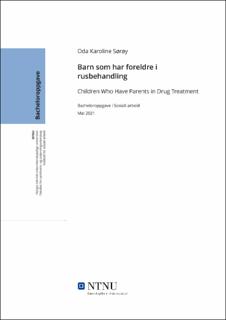| dc.contributor.advisor | Juberg, Anne | |
| dc.contributor.author | Sørøy, Oda Karoline | |
| dc.date.accessioned | 2021-09-28T18:48:00Z | |
| dc.date.available | 2021-09-28T18:48:00Z | |
| dc.date.issued | 2021 | |
| dc.identifier | no.ntnu:inspera:79529603:34413961 | |
| dc.identifier.uri | https://hdl.handle.net/11250/2785765 | |
| dc.description.abstract | Barn som pårørende har de siste årene fått økt oppmerksomhet i det politiske landskapet i Norge. Gjennom nye lovverk som retter seg mot å sette barn av foreldre med rusmiddelavhengighet i front, har barn som pårørende blitt et begrep som helsepersonell nå må ta hensyn til. Forskning tyder på at barn som har foreldre i rusbehandling har behov for informasjon rundt foreldrene, og en arena der de kan samtale om komplekse følelser. Barn som har hatt en oppvekst preget av rus er også disponert for å utvikle inngripende følelser av skam og skyld, og har behov for å sette alle disse kaotiske tankene i sammenheng. I denne oppgaven har jeg derfor valgt å ha et særskilt fokus på barn som har foreldre i Tverrfaglig spesialisert rusbehandling (TSB), og hvordan de kan bli ivaretatt av behandlere i TSB og bidra til deres opplevelse av sammenheng. Jeg har drøftet ulike perspektiver og tilnærminger gjennom å anvende relevant litteratur. Innhentingen av den relevante litteraturen er gjort gjennom systematisk litteratursøk, samt kjedesøk og supplering med andre relevante kilder. Funnene viser blant annet viktigheten av å ha samtaler med barn som fører til opplevelse av sammenheng og hvorfor familieorientert rusbehandling kan være hensiktsmessig å innlemme som en del av ordinær praksis i Tverrfaglig spesialisert rusbehandling (TSB). | |
| dc.description.abstract | In recent years, children of parents with drug addiction have received increasing attention in the political landscape in Norway. New legislation has aimed at putting children of parents with drug addiction at the forefront and health professionals must now take it into account in their daily work. Research indicates that children who have parents in substance abuse treatment need information about their parents' problems, and an arena where they can talk about complex emotions. Children who have had a difficult childhood with parents suffering from substance abuse problems are also predisposed to develop intrusive feelings of shame and guilt, and have a need to put all these chaotic thoughts into context. In this thesis, I have therefore chosen to discuss how children can be taken care of by therapists in specialized drug treatment and contribute to their sense of coherence. I have discussed different perspectives and approaches through the use of relevant literature. The collection of the literature has been done with a systematic literature search, in addition to other relevant sources. The findings shows the importance of having meaningful conversations with children and why family-oriented substance abuse treatment could be appropriate to incorporate as part of ordinary practice in drug treatment. | |
| dc.language | nob | |
| dc.publisher | NTNU | |
| dc.title | Barn som har foreldre i rusbehandling | |
| dc.type | Bachelor thesis | |
